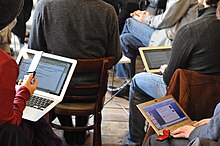
Back የሰው ብዙ ሥራ Amharic تعدد المهام عند الإنسان Arabic معاطشة ARY Menneskelig multitasking Danish Multitasking (Psychologie) German Multitasking Spanish Rööprähklemine Estonian چندوظیفگی انسانی Persian Multitasking French ריבוי משימות (קשב) HE

Human multitasking is the concept that one can split their attention on more than one task or activity at the same time, such as speaking on the phone while driving a car.
Multitasking can result in time wasted due to human context switching (e.g., determining which step is next in the task just switched to) and becoming prone to errors due to insufficient attention. Some people may be proficient at the tasks in question and also be able to rapidly shift attention between the tasks, and therefore perform the tasks well; however, self-perception of being good at multitasking or getting more done while multitasking is frequently inaccurate.[1][2]
Multitasking is mentally and physically stressful for everyone,[3] to the point that multitasking is used in laboratory experiments to study stressful environments.[4] Research suggests that people who are multitasking in a learning environment are worse at learning new information compared to those who do not have their attention divided among different tasks.[5][6][7]
- ^ Cite error: The named reference
:0was invoked but never defined (see the help page). - ^ Cite error: The named reference
Walliswas invoked but never defined (see the help page). - ^ Wetherell, Mark A.; Carter, Kirsty (April 2014). "The Multitasking Framework: The Effects of Increasing Workload on Acute Psychobiological Stress Reactivity". Stress and Health. 30 (2): 103–109. doi:10.1002/smi.2496. ISSN 1532-3005. PMID 23723144.
- ^ Heid, Markham (January 23, 2024). "That Smartphone in Your Hand Changes How You Walk". The New York Times.
When scientists want to study stress, they often ask people to perform several tasks at once. That's because multitasking is a reliable way to stress people out.
- ^ Cite error: The named reference
:1was invoked but never defined (see the help page). - ^ Carrier, L. Mark; Rosen, Larry D.; Cheever, Nancy A.; Lim, Alex F. (March 1, 2015). "Causes, effects, and practicalities of everyday multitasking". Developmental Review. Special Issue: Living in the “Net” Generation: Multitasking, Learning, and Development. 35: 64–78. doi:10.1016/j.dr.2014.12.005. ISSN 0273-2297.
- ^ Peng, Yaoping; Tullis, Jonathan G. (December 1, 2021). "Dividing attention impairs metacognitive control more than monitoring". Psychonomic Bulletin & Review. 28 (6): 2064–2074. doi:10.3758/s13423-021-01950-9. ISSN 1531-5320. PMC 8205317. PMID 34131889.
© MMXXIII Rich X Search. We shall prevail. All rights reserved. Rich X Search